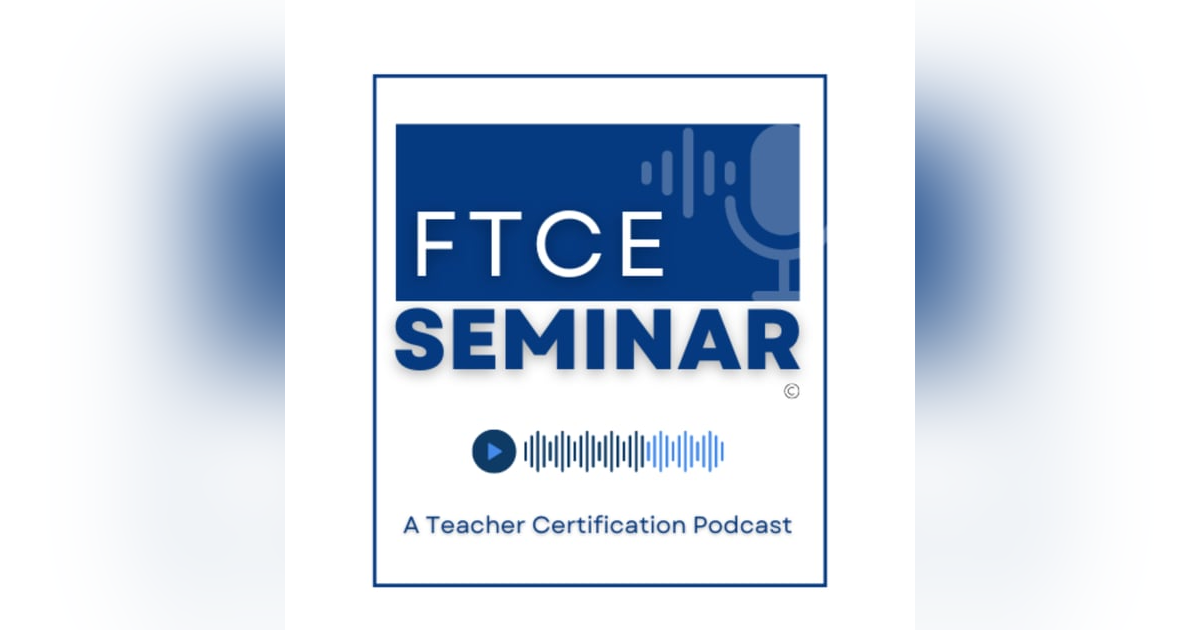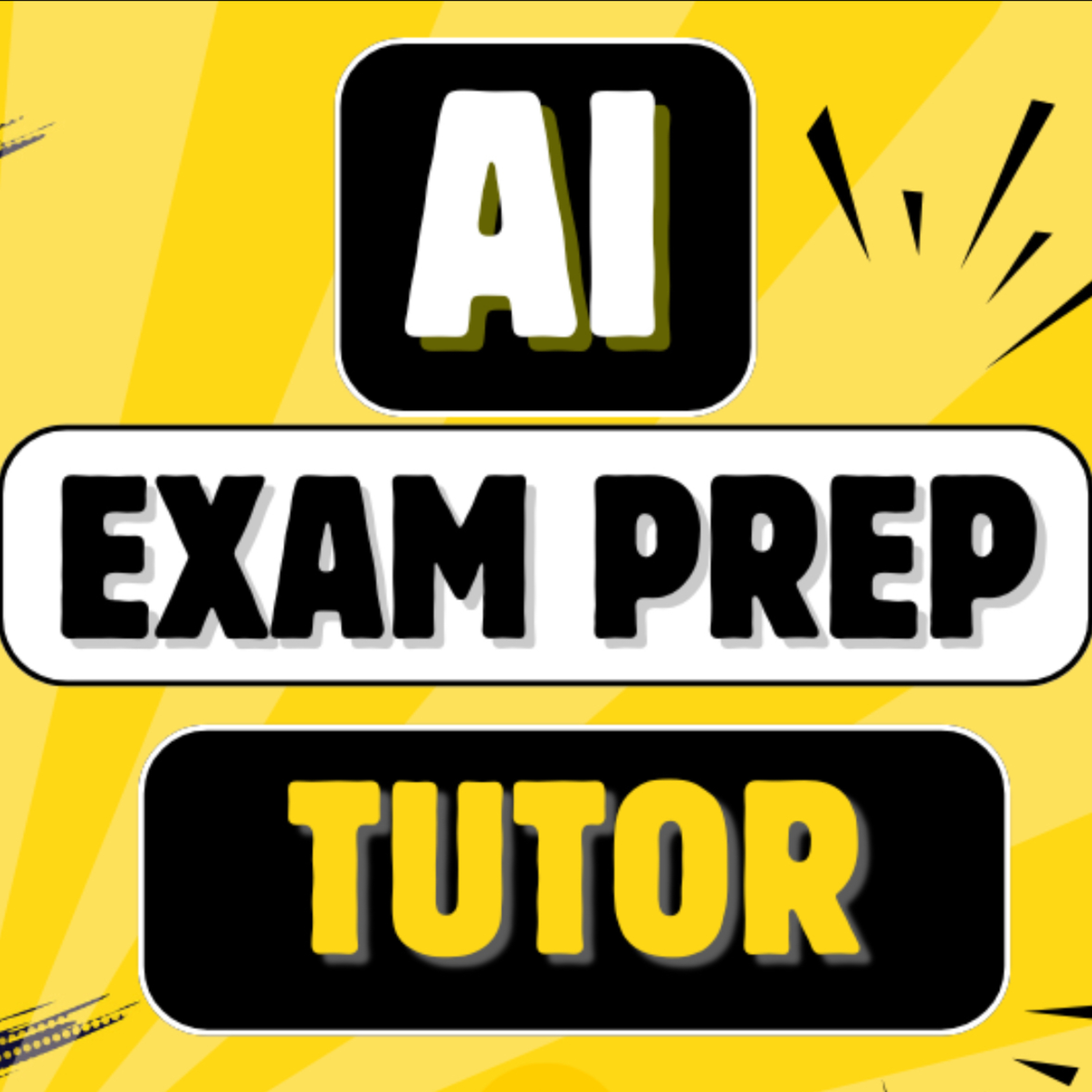E25: FTCE | GK Reading | Summarizing Strategies for Text
E25: Teacher Certification Podcast | FTCE | Reading | Summarizing Strategies for Text
In today’s episode, I’ll be talking about the FTCE General Knowledge Reading Subtest. This is part 4 of a multi-series review of what YOU need to know to pass the Reading section of the GK.
About FTCE Seminar
How do you PASS the Florida Teacher Certification Exams (FTCE)? On this podcast, we will be discussing concepts from the FTCE Testing Blueprint to help you prepare for the exam. ..Not only is each episode based on the FTCE General Knowledge essay subtest, English Language Skills subtest, Reading subtest, and Mathematics subtest, but I am also using my experience as a FTCE Tutor, 10 year classroom teacher who has passed the FTCE GK Exam, FTCE Professional Education Exam, FTCE Exceptional Student Education Exam, FTCE English 6-12 Exam, FTCE Journalism Exam, and the Reading Endorsement to help you pass and start teaching. ..How do educational podcasts work? Each podcast covers one concept from the FTCE Testing Blueprint. This method is called micro-learning where you listen repeatedly to concepts to reinforce your knowledge and understanding. Try it out! Check it out! And leave your questions and comments below.
-----------------------------------------------
RESOURCES (Free)
💢 FTCE/FELE https://www.fl.nesinc.com/
💢 FTCE Seminar Websitehttps://www.ftceseminar.com/
💢 FTCE Podcasting Study Guides @ TpTStudy Hacks Podcast Guide.
-----------------------------------------------
RESOURCES (For Purchase)
⚡️ FTCE Podcasting Study Guides @ TpT
- FTCE GK Essay Prep
- FTCE GK English Language Skills Prep
- FTCE GK Reading Prep
- FTCE GK Math Prep
⚡️ FTCE Test Prep Books @ Amazon
- General Knowledge Exam https://amzn.to/3QQrCrv
- Professional Education Exam https://amzn.to/4aHwuql
- Elementary Education Exam https://amzn.to/3WN5FNX
- Exceptional Student Education Exam https://amzn.to/3V5CLY0
- *As an Amazon Associate I earn from qualifying purchases made via links which provide a small commission to this channel and accompanying website.
-----------------------------------------------
Support and Donations
💟This podcast and channel are listener supported, contributions can be made at:https://www.buymeacoffee.com/ftceseminar
You can subscribe to the FTCE Seminar Podcast at www.ftceseminar.com
------------------------------------------------
#FTCE #teachercertification #teachers #education #podcast #educationalpodcast #certification #mathprep #professionaleducation #englishprep #essayprep #generalknowledge #teachertraining #exam #test #motivation #study #studyhacks #english #reading #maths #teachereducation #assessment #testtakingstrategies #readings #mathpreparation #englishgrammar #exammotivation #exampreparation #overthinking #practicetests #motivational #testanxiety #readingcomprehension
--- Support this podcast: https://podcasters.spotify.com/pod/show/ftceseminar/support0:00:00
Welcome to episode 25 of FTCE seminar, a teacher certification podcast. I'm your host, Mercedes Musto. In today's episode, I'll be talking about the FTCE general knowledge reading subtest. This is part four of a multi-series review of what you need to know to pass the reading section of the GK.
0:00:19
Today, we're gonna talk about summarizing, you know, one or more text, using key supporting ideas and details. That's right, summarizing. I mean, what's that anyway? Well, let's get started. Concept one, summarizing. According to readingrockets.org,
0:00:39
summarizing is being able to select the most important ideas about reading and then restate them in your own words. Another thing about summarizing is that all those ideas you've selected can be backed up by actual supporting details that you've actually read in the text. There's some key benefits to learning to summarize, like improved memory and reading comprehension, because you literally are reviewing in your mind what you just read. In fact, ReadingRockets.org puts it like this, when you learn the complex skill of summarizing,
0:01:15
you're actually learning, one, how to select the key ideas in a text, two, how to ignore irrelevant information, and three, how to integrate the key ideas so that your summary makes sense. I like to use two methods when I'm practicing summarizing. The first method I call, your cell phone battery is about to die.
0:01:36
Well, what if you had to give the whole synopsis of the movie Frozen to your sister before she went to see Frozen 2, but you didn't charge your cell phone and you literally only had 30 seconds to tell her who are the main characters, what the movie is about, and where it takes place. Well, and how they solve their problem. And then after that, even why what you've summarized is meaningful. Which leads me to the second method, is really actually a better method, but it's called using the five W's to summarize.
0:02:10
I know, I know you figured it out. That's great. That's because you're a thinker, and a good one at that. Now, back to the five W's. The five W's are who, what, when, where, and why. Applying the five W's to a text helps you to Why?
0:02:28
Applying the 5 W's to a text helps you to focus and select information. For example, back to Disney's movie Frozen, listen to the following sentence and be thinking about the 5 W's. A princess named Anna sets off on a journey with a mountaineer named Kristoff, his reindeer, and a snowman to find her snow queen sister Elsa in an attempt to break Elsa's icy spell. I mean she is a snow queen after all and stop her magical powers from trapping their kingdom in an internal winter forever. Ooh man that's a lot. Okay ready? Now what is the who what when where and why of it all? Let's think about this who. Well there's a bunch of who's, but the main ones are Anna, Christoph, and Elsa.
0:03:18
What is going on? According to the passage I read, Anna and Christoph set off on a journey. Okay, fair enough. When? The text is not specific on this, but we can generalize the time as winter. Where? Since the text uses the word mountaineer, reindeer, and snowman, we can infer that the story takes place in a certain colder climate, like the mountains. Why? Going back to the text again.
0:03:47
Why are Anna and Kristoff on a journey? Because they're attempting to break the Snow Queen's icy spell trapping their kingdom in eternal winter forever! Well, naturally, the text you will be reviewing for the test is a lot more complex than Disney's fun adventure film Frozen. But it's important that you're able to have a summarizing tool like the five W's to help you navigate more complex text. So let's try another one. Here's a sentence that is actually from the FTC practice website where the reading practice test is, and we're going to unpack this.
0:04:23
So listen carefully.
0:04:24
Okay.
0:04:24
Now, just for practice, apply the five W's. That was hard to say the five W's to the sentence. When Hernando Cortez left Cuba in February of 1519 with 550 soldiers on 11 ships, he could have no idea that one of the oldest soldiers in his company would become the last survivor of his great conquest. Oh man, that's kind of a thick sentence. That was one sentence. Okay, who?
0:04:56
Hernando Cortez. What? Here, the what is not explicit, but we can infer that he's on a ship with soldiers. When? In 1519, got that. Where? Well, he left Cuba, and that's according to the text.
0:05:13
And why? Sounds like he was on a great conquest. So to summarize in my own words, we've got a guy named Hermando Cortes who left Cuba in 1519 on a ship with hundreds of soldiers on a great conquest. And that's it. Just like that, you get the gist of a text
0:05:32
based on supporting details from the same text, all packaged in a nice little summary. Now, when we've plucked the five W's from the sentence to create a summary, we purposely left out several other details like 550 soldiers, 11 ships, and something about the oldest survivor. We did this because summarizing
0:05:56
is about selecting key ideas and information. Let's review. Remember that summarizing is being able to select the most important ideas about a reading or text and then restating those ideas in your own words. Learning to summarize text will improve your memory and improve your reading comprehension because you're practicing applying the complex skill
0:06:19
of organizing information. Back to reading rockets. When you learn the complex skill of summarizing, you're actually learning 1. How to select key ideas in a text, 2. How to ignore irrelevant information, and 3. How to integrate the key ideas meaningfully. So pause and practice summarizing the next time you read a paragraph or a whole text so you can master this complex reading comprehension skill. For more practice reading strategies, visit ftceseminar.com to study for the test. The important thing is to start studying and start studying today so you can pass the teacher certification exam. Well, what are you waiting for?
0:07:02
Check us out on YouTube at FTCE Seminar and start studying today! This podcast was recorded at the Pickens Multimedia Studio at the University of West Florida. This is your host, Mercedes Musto. Join me again on FTCE Seminar, This is your host, Mercedes Musto. Join me again on FTCE Seminar, a teacher certification podcast so you can pass the FTCE.
Transcribed with Cockatoo














